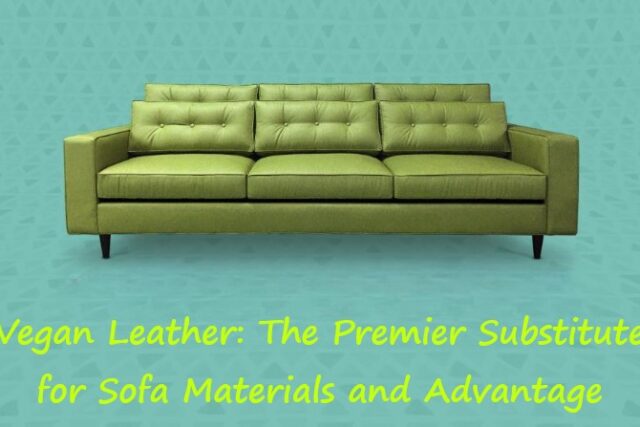Explore the benefits and possibilities of vegan leather as the leading alternative material for sofas. Discover how this eco-friendly option offers a stylish and sustainable choice for your living space.
Table of Contents
What is Vegan leather
Vegan leather, also known as synthetic leather, faux leather, or leatherette, is a material that mimics the aesthetic and functional properties of traditional animal leather but is created without using any animal products. It represents a cruelty-free alternative in the fashion and design industries, offering a sustainable and ethical choice for consumers and designers alike. Vegan leather can be made from a variety of materials, including polyurethane (PU), polyvinyl chloride (PVC), plant-based materials like cork, pineapple leaves (Piñatex), apple peels, and even mushroom (Mylo).

The Rise of Vegan Leather in Furniture Design
In recent years, vegan leather has seen a significant rise in popularity within the furniture industry, particularly in the manufacturing of sofas. This shift is driven by a growing consumer demand for sustainable and ethical home decor options, as well as advancements in the quality and variety of vegan leather materials available. Vegan leather sofas offer a stylish, durable, and cruelty-free alternative to traditional leather furniture, aligning with modern ethical standards and environmental consciousness.
Benefits of Vegan Leather Sofas
Vegan leather sofas are emerging as a popular and conscious choice for modern living spaces, blending ethical values with aesthetic appeal and practicality. Here’s a closer look at the benefits of incorporating vegan leather sofas into your home:
1. Ethical and Cruelty-Free Choice
The primary allure of vegan leather sofas lies in their compassionate production process. Opting for vegan leather ensures that no animals are subjected to harm, offering peace of mind for those concerned with animal welfare. This ethical consideration is a significant driving force for many consumers, making vegan leather sofas a morally sound addition to any home.
2. Positive Environmental Impact
Vegan leather sofas contribute to a more sustainable and eco-friendly lifestyle. When made from natural or recycled materials, such as Piñatex (derived from pineapple leaves), they demand fewer environmental resources — notably, water, energy, and chemicals. This sustainable production process leads to a reduction in pollution and helps conserve vital natural resources, aligning your home decor choices with environmental stewardship.
3. Durability and Easy Maintenance
Contrary to the misconception that vegan leather might lack in resilience, modern advancements have resulted in vegan leathers that stand up well to daily use. These materials are crafted to resist scratches and wear, making them perfect for busy households. Additionally, vegan leather sofas are notably easy to care for. Simple cleaning with a damp cloth can remove most spills and stains, sparing homeowners the hassle and expense of specialized cleaning products required for traditional leather care.

4. Versatile Design Options
The aesthetic versatility of vegan leather allows for a broad spectrum of design possibilities. Available in an array of textures, colors, and finishes, vegan leather can seamlessly integrate into various interior design themes, from sleek and modern to cozy and traditional. This versatility empowers homeowners and interior designers to experiment and express their unique style without compromise.
5. Affordability
Cost-effectiveness is another significant advantage of vegan leather sofas. They generally come at a lower price point than sofas upholstered with animal leather, making stylish and comfortable seating options more accessible. This affordability means that you can achieve the luxurious look and feel of leather without straining your budget, offering both style and practicality.
Vegan leather sofas stand out not just for their ethical and environmental benefits but also for their practical advantages, including durability, maintenance ease, design flexibility, and cost-effectiveness. As consumer awareness grows and priorities shift towards more sustainable and compassionate choices, vegan leather sofas represent a forward-thinking option for contemporary living spaces.
Challenges and Considerations
1. Quality Variability: The quality of vegan leather can vary significantly depending on the material and manufacturing process. While high-quality vegan leathers are comparable to animal leather in durability and aesthetics, lower-quality options may wear out more quickly.
2. Environmental Concerns of Synthetic Options: While plant-based vegan leathers are eco-friendly, synthetic options like PVC and PU are derived from fossil fuels and can contribute to plastic pollution. Consumers interested in the most sustainable options should research the materials and production methods used in their vegan leather sofas.

3. Comfort and Breathability: Some users find that vegan leather does not offer the same breathability as genuine leather, which can affect comfort during prolonged use. Advances in materials technology are addressing this issue, with newer vegan leathers improving in terms of comfort and air circulation.
The Future of Vegan Leather in Furniture
The use of vegan leather in furniture, particularly sofas, is part of a broader trend towards more sustainable and ethical home furnishings. As consumer awareness and demand continue to grow, we can expect to see further innovations in vegan leather materials, making them even more indistinguishable from traditional leather in terms of quality, comfort, and aesthetic appeal. The industry is moving towards a future where ethical and sustainable choices are at the forefront of design, offering consumers furnishings that not only look good but also contribute positively to the planet and animal welfare.
In a conclusion, Vegan leather sofas represent a significant shift in the furniture industry, reflecting the changing priorities of consumers who seek products that are not only stylish and practical but also align with their ethical and environmental values. With ongoing advancements in materials science and a growing emphasis on sustainability, vegan leather has become an increasingly popular choice for sofas and other furnishings. As we move forward, the continued development and adoption of vegan leather will play a crucial role in shaping a more responsible and conscious approach to interior design and manufacturing.


MOST COMMENTED
Animal-Based Proteins / Casein Protein / Dietary Protein / High-Protein Diets / Pea Protein / Plant-Based Proteins / Protein / Protein Deficiency / Protein Supplements / Proteins / Whey Protein / Whey Proteins
Is Protein Powder Safe for Teenagers and Children?
Animal-Based Proteins / Casein Protein / Dietary Protein / High-Protein Diets / Pea Protein / Plant-Based Proteins / Protein / Protein Deficiency / Protein Supplements / Proteins / Whey Protein / Whey Proteins
Unlock the Power of Proteins for Optimal Gut Health
Multivitamin
Total Health: Multivitamin for Active Lifestyles
Multivitamin
WellnessFusion: Complete Multivitamin Support
Dietary Supplement
Revitalize Your Health: The Magic of Red Yeast Rice Capsules
Foot care / Foot Health
Revitalize Your Foot Care Routine: Essential Tips for Optimal Foot Health
Foot Problem / Diabetics / Foot Health
Diabetics: Mastering Footwear Selection for Enhanced Foot Health and Ultimate Comfort
Exercises and Footwear Tips for Hammertoe Relief / Foot care / Foot Health / Foot Pain / Foot Problem / Hammertoes
Unlock Effective Exercises and Footwear Tips for Hammertoe Relief
Hammertoes / Foot Health / Foot Pain / Foot Problem
Unlock Relief: Essential Guide to Hammertoes Causes, Symptoms, and Treatments
Foot Problem / Foot Health
Revolutionize Your Recovery: Natural Remedies for Plantar Fasciitis – Fresh Home Keepers